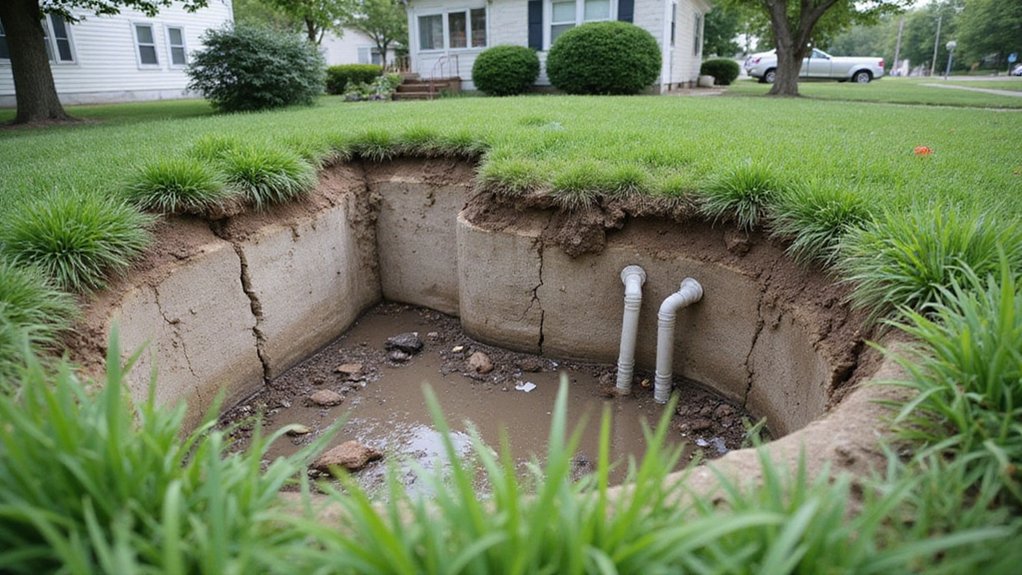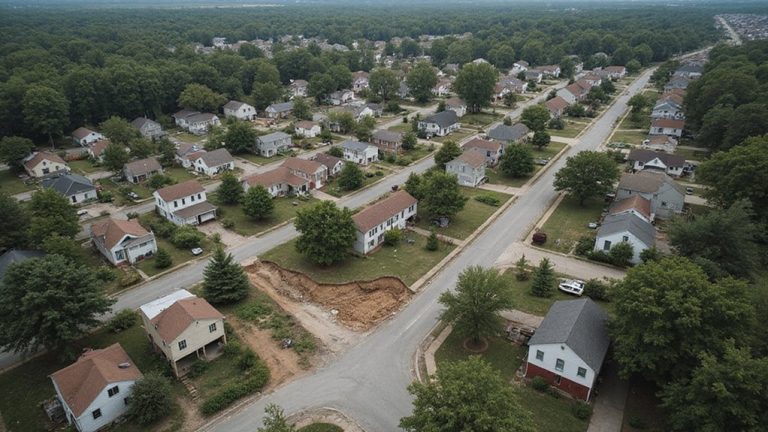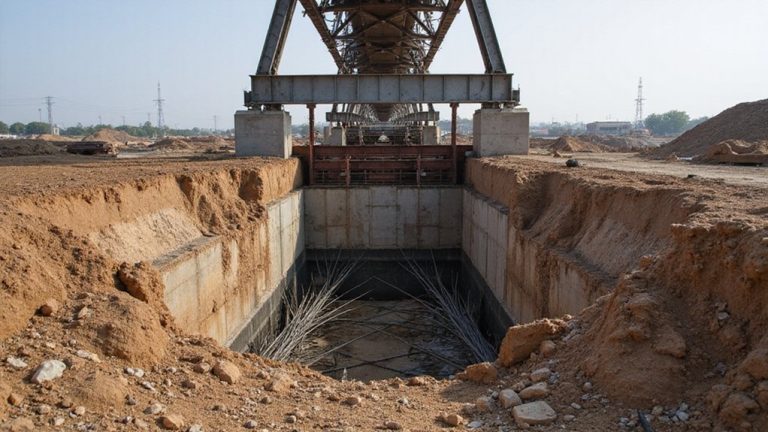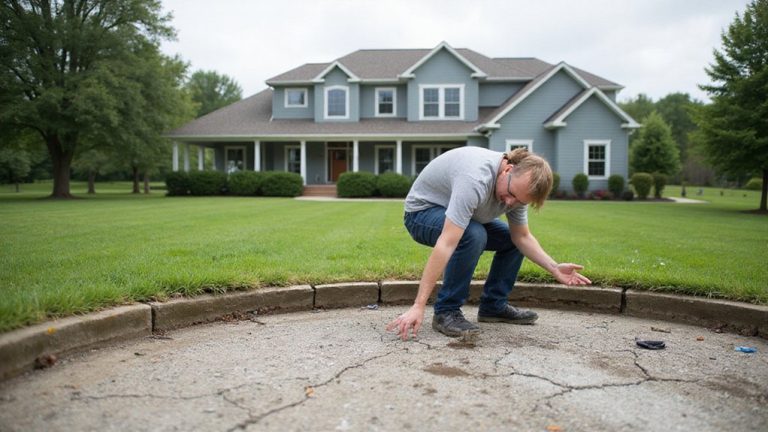As a Cleveland homeowner, you know the challenges that come with the city’s unique soil conditions. Shaped by glaciation, this mix of clay, silt, and sand can lead to swelling and shrinking, compromising your home’s structural integrity. Aging infrastructure, like deteriorating pipes and drainage systems, only exacerbates the problem, causing costly foundation wall damage and moisture issues. But recognizing the signs of sinking foundations is key to finding the right solutions to stabilize and lift your home, addressing the soil’s unique properties.
Understanding Cleveland’s Soil Conditions
If you’re a Cleveland homeowner, you may have noticed that the soil conditions in your area can be quite challenging. The soil composition in Cleveland is heavily influenced by the region’s history of glaciation, resulting in a mix of clay, silt, and sand. This combination can make the soil prone to swelling and shrinking, especially as water table levels fluctuate.
This instability can lead to foundation issues, such as cracking, heaving, or settling, which can be concerning for homeowners. Understanding the unique soil characteristics of your Cleveland property is imperative in addressing any foundation problems you may encounter. Soil preparation challenges can significantly impact a home’s structural integrity, potentially leading to costly foundation repairs if not addressed promptly.
The Impact of Aging Infrastructure
As a Cleveland homeowner, you’ve likely noticed the aging infrastructure in your neighborhood. This poses a significant challenge, as deteriorating pipes and compromised drainage systems can lead to costly home repairs. Foundation wall damage can result from ongoing infrastructure issues, particularly when poor soil conditions and moisture problems are left unaddressed.
The impact of aging infrastructure on your property value and overall quality of life can’t be overstated. To address these issues, consider the following:
- Investing in regular pipe inspections and preventative maintenance
- Upgrading outdated drainage systems to mitigate flooding and water damage
- Researching local government initiatives that may offer assistance or subsidies
- Engaging with your community to advocate for infrastructure improvements
Recognizing the Signs of Sinking Foundations
While a sinking foundation may not be the first issue that comes to mind, it’s essential to recognize the signs early on. Shifting ground patterns, such as uneven floors or cracks in the walls, could indicate a foundation problem.
Moisture infiltration, like leaks or pooling water around the home’s perimeter, can also contribute to foundation settling. If you notice these warning signs, it’s best to have a professional assess the situation. Addressing a sinking foundation immediately can prevent further structural damage and costly repairs down the line. Don’t wait – take action to protect your home and investment.
The Risks of Neglecting Foundation Issues
Neglecting foundation issues can lead to a range of problems that will only worsen over time, causing significant headaches and expense for Cleveland homeowners. Unseen water damage can rot the wooden structure and promote mold growth, compromising your home’s safety and value.
Improper grading around the foundation can allow water to pool, further destabilizing the structure and leading to cracks or uneven settling. Ignoring these issues can also:
- Cause doors and windows to stick or fail to close properly
- Result in uneven floors and walls
- Necessitate costly repairs or even foundation replacement
- Decrease your home’s resale value
Underpinning: Stabilizing Sinking Foundations
If your home’s foundation is sinking, undergirding is a proven solution that can stabilize and lift your structure back to its proper position. Underpinning techniques involve excavating beneath the existing foundation and inserting sturdy supports, such as concrete piers or steel pilings, to distribute the home’s weight evenly.
This foundation reinforcement process can address issues like uneven settling, cracks, and structural shifts. While underpinning may seem challenging, it’s a reliable way to restore your home’s stability and prevent further damage. An experienced professional can assess your specific needs and guide you through the process step-by-step.
Soil Stabilization Techniques
Two effective soil stabilization techniques for Cleveland homeowners are chemical grouting and soil compaction.
Chemical grouting involves injecting a liquid grout mixture into the soil, which then hardens and strengthens the ground. This can help stabilize sinking foundations and prevent further settlement.
Soil compaction uses specialized equipment to densify the soil, increasing its bearing capacity and reducing the risk of subsidence. This technique is often used in areas with weak or unstable soils.
Ground improvement methods like these, guided by thorough soil testing protocols, can effectively address soil-related foundation issues for Cleveland homeowners.
Comprehensive Foundation Repair Solutions
While soil stabilization techniques can address certain foundation issues, thorough foundation repair solutions are often necessary to fully resolve more complex problems.
Cleveland homeowners facing foundation troubles should consider extensive repair methods, which may include underpinning, mudjacking, or slabjacking. These foundation repair techniques can effectively lift, level, and stabilize your home’s foundation, helping to prevent further damage and costly long-term issues.
The foundation repair cost will vary based on the degree of the work required, but professional assessment can provide a clear understanding of your options and associated expenses. Don’t let a sinking foundation weigh you down – investigate extensive repair solutions to restore your home’s stability.
Proactive Maintenance for Long-term Stability
Proactive maintenance is key to ensuring your home’s foundation remains stable over the long haul. Regular inspections and effective maintenance can help prevent costly repairs down the line.
Consider these tips:
- Inspect for cracks, settling, or uneven floors at least once a year.
- Address any issues promptly, whether it’s sealing cracks or adjusting supports.
- Maintain proper drainage around your home to prevent water buildup.
- Consider professional foundation assessments every 5-10 years to identify potential problems early.
Staying on top of your home’s foundation health can save you time, money, and headaches in the future.
Frequently Asked Questions
How Much Does Foundation Repair Typically Cost in Cleveland?
The cost of foundation repair in Cleveland can vary, but it typically ranges from $3,000 to $15,000 depending on the structural integrity needed. Neighborhood comparisons can impact pricing, so consult local contractors to find the best solution for your home.
Can I Do Foundation Repairs Myself as a Homeowner?
DIY foundation repairs can be risky and challenging. It’s best to consult a professional for guidance to guarantee the job’s done right and your home is secure. Seeking expert help is worth it to safeguard your investment.
How Long Does a Foundation Repair Project Usually Take?
The duration of a foundation repair project typically ranges from 1-4 weeks, depending on the extent of the foundation inspection and stabilization required. The timeline can vary based on the specific issues identified during the assessment.
What Financing Options Are Available for Foundation Repairs?
You can finance foundation repairs through home equity loans or government grants. Home equity loans use your home’s value as collateral, while grants provide funding without repayment. Investigate these options to get the support you need.
Will Foundation Issues Affect My Home’s Resale Value?
Foundation issues can greatly influence your home’s resale value. Addressing buyer concerns about structural soundness is vital. Proactively addressing any foundation problems can help sustain your home’s market value and appeal to potential buyers.



